This site uses cookies as defined in our Cookie Policy, by continuing to use this site you agree to their use.
Continue
| Arrive | Depart | ||||||
| 17th17 | JanJan | 202626 | Bridgetown, Barbados, embark on the Emerald Sakara | ||||
Located beside the island’s only natural harbour, the capital of Barbados combines modern and colonial architecture with glorious palm tree-lined beaches and a number of historical attractions. Experience the relaxed culture of the city renowned for its British-style parliament buildings and vibrant beach life, and seek out the Anglican church and the 19th-century Barbados Garrison. The distance between the ship and your tour vehicle may vary. This distance is not included in the excursion grades. Your Emerald Cruises exciting Caribbean journey begins in Bridgetown in Barbados, renowned for its vibrant culture and photogenic beaches. You’ll be transferred to your Emerald Cruises luxury yacht to begin an adventure into paradise. Please book your flight to arrive into Bridgetown prior to 04:00 PM. Docked: 21:00 | |||||||
| 18th18 | JanJan | 202626 | Soufrière, Saint Lucia | ||||
The oldest town in St. Lucia and the island’s former French colonial capital, Soufrière was founded by the French in 1746 and named for its proximity to the volcano of the same name. The wharf is the center of activity in this sleepy town (population, 9,000), particularly when a cruise ship anchors in pretty Soufrière Bay. French colonial influences are evident in the second-story verandahs, gingerbread trim, and other appointments of the wooden buildings that surround the market square. The market building itself is decorated with colorful murals. Soufrière, the site of much of St. Lucia’s renowned natural beauty, is the destination of most sightseeing trips. This is where you can get up close to the iconic Pitons and visit colonial capital of St. Lucia, with its "drive-in" volcano, botanical gardens, working plantations, waterfalls, and countless other examples of the natural beauty for which St. Lucia is deservedly famous. Tucked away in a stunning bay, Soufrière, the former capital of St. Lucia, offers an array of attractions. Renowned for The Pitons, majestic volcanic spires that loom over the town's entrance, Soufrière is a sight to behold. Nearby, the lush botanical gardens invite you to experience the healing benefits of the Diamond Falls mineral baths. At the northern edge of the bay, a beach provides the perfect launching point for exploring vibrant reefs adorned with beautiful sea fan gardens at the base of the dramatic cliffs that dive into the ocean. Today choose between our Included Excursion or our EmeraldACTIVE option. Included Excursion EmeraldACTIVE Offshore: 08:00 - 18:00 | |||||||
| 19th19 | JanJan | 202626 | Îles des Saintes, Guadeloupe | ||||
This small group of islands lies opposite the western part of Guadeloupe. They were discovered in November 1493 by Columbus, who named them Los Santos. French settlers established themselves in 1648 and changed the name to Iles des Saintes, commonly known as Les Saintes. Since then the islands have been closely connected with Guadeloupe. Until a recent influx of tourism, Les Saintes were among the Caribbean’s most unspoiled destinations. Only two of the eight islands are inhabited: Terre-de-Bas and Terre-de-Haut. The latter is known for its impressive Fort Napoleon built in the early 19th century to replace an earlier 17th-century fort. From its vantage point there are fine views of the many tiny islets scattered in the bay and across to Guadeloupe. Terre-de-Haut is the main island of Les Saintes, with steeply scarped hills, scenic valleys, hidden coves and beautiful beaches. Its main settlement consists of a charming village of red-roofed houses situated along a curving bay. A number of small boutiques and gift shops invite browsing. Quaint cafés and restaurants offer food and drink. To the east of the village lies Grande Anse, a fine sand beach. Most of the attractions on this small island can be seen on foot. With just a few vehicles on the island, there are no organized tours possible. Time ashore here is at your leisure. Îles des Saintes, known as Les Saintes, is a miniature archipelago of eight tropical islands with a distinctive French and Caribbean culture fusion. Discover the quaint towns, with their collection of petite stone buildings and small white-sand beaches. Don’t miss Fort Napoleon, a significant historical site with incredible views of one of the islands. DiscoverMORE Offshore: 09:00 - 21:00 | |||||||
| 20th20 | JanJan | 202626 | Falmouth, Antigua and Barbuda | ||||
The British colonial influence is everywhere in pretty English Harbour. And yet, located on Antigua’s south coast, you are just minutes away from some of the loveliest beaches in the Caribbean. With its long ribbons of white sandy shores including the superbly named Rendez-Vous Bay Beach, the cold English drizzle and chimes of big ben have never been farther away! English Harbour is how the Caribbean is meant to be. Beautifully restored, the area still retains much in the way of its rich historic past. Nelson’s dockyard is absolutely not to be missed; a working dockyard that dates from the 18th century, this is part of a larger UNESCO World Heritage Site (Nelson’s Dockyard and National Park) which also contains Clarence House and Shirley Heights. Perhaps one of the best examples of British colonial development, the dockyard is named after the famous Admiral who lived on the island in the 1780’s. The fascinating naval history is palpable in all the buildings of this historic site and just a little further along you find beautifully restored warehouses that are now home to enchanting restaurants, art galleries, boutiques and hotels, all proudly stating their historic credentials on prominent, easy to read signs. Venturing beyond the “town” and you’ll find nature trails for all levels of fitness. Famous for having 365 different beaches, it is unsurprising then that a lot of Antiguan life takes place on its sandy shores. Beaches here offer all things to everyone so whether you want to rekindle the romance, indulge in some adrenaline fueled water sports, swim, snorkel or sail your way around the island, you’re sure to find you’re your own personal paradise here. Falmouth Bay, situated on the island of Antigua, is a serene harbour surrounded by historic structures and plantation mansions from a past era. A visit to Nelson’s Dockyard is a must—this UNESCO World Heritage site, dating back to the 18th century, features captivating naval history along with charming boutiques, bars, and restaurants. DiscoverMORE DiscoverMORE Offshore: 08:00 - 23:00 | |||||||
| 21st21 | JanJan | 202626 | Charlestown, Saint Kitts and Nevis | ||||
Nevis and Saint Kitts are a dual-island nation in the Lesser Antilles archipelago of West Indies in the Caribbean Sea — Nevis is the smaller island of the two. Edged with unspoilt curves of sand, the island is dotted with Georgian-style buildings, remnants of sugar plantations and casual, beach-shack eateries. DiscoverMORE Offshore: 08:00 - 13:00 | 14:00 - 21:00 | |||||||
| 21st21 | JanJan | 202626 | Saint Kitts, Saint Kitts and Nevis | ||||
| 22nd22 | JanJan | 202626 | Gustavia, Saint Barthélemy | ||||
You can easily explore all of Gustavia during a two-hour stroll. Some shops close from noon to 3 or 4, so plan lunch accordingly, but stores stay open past 7 in the evening. Parking in Gustavia is a challenge, especially during vacation times. A good spot to park is rue de la République, alongside the catamarans, yachts, and sailboats. Affectionately known as Saint-Barth, this enchanting French island in the Lesser Antilles was named in honor of King Gustav III of Sweden after France ceded the island to Sweden in 1784. Since then, its picturesque mountainous landscapes and pristine natural beauty have captivated visitors. You can bask in the splendour of its stunning beaches, while also admiring the charm of its historic wooden houses and luxurious colonial estates. As you stroll through the streets of Gustavia, you'll find an array of jewellery shops, high-end fashion boutiques, and gourmet restaurants, all while experiencing a sense of simplicity that wealth cannot replicate. DiscoverMORE DiscoverMORE DiscoverMORE Offshore: 07:00 - 23:00 | |||||||
| 23rd23 | JanJan | 202626 | Prickly Pear Island, Antigua and Barbuda | ||||
This morning, we cruise to Anguilla, the most northerly of the British Leeward Islands, popular for diving, snorkelling and glass-bottomed boat rides. Anguilla is a low-lying island of coral and limestone and has beautiful island scenery of palm trees, plantation houses and vibrant viridian waters contrasting with white sand. In the late evening, we sail to Marigot. EmeraldPLUS Offshore: 08:00 - 17:00 | |||||||
| 24th24 | JanJan | 202626 | Marigot, Saint Martin (French part) | ||||
French and Dutch have lived side by side on St. Maarten/St. Martin for hundreds of years—with no border patrols or customs between them. The French side has a more genteel ambience, more fashionable shopping, and a Continental flair. The Dutch tends to be less expensive, has casino hotels, and more nightlife. Water sports abound all over—diving, snorkeling, sailing, and windsurfing are all top draws. And it's easy to while away the day relaxing on one of the 37 beaches, strolling the boardwalk of Dutch-side Philipsburg, and exploring the very French town of Marigot. Although luck is an important commodity at St. Maarten's 13 casinos, chance plays no part in finding a good meal at the island’s excellent eateries. The best way to explore St. Maarten/St. Martin is by car. Though often congested, especially around Philipsburg and Marigot, the roads are fairly good, though narrow and winding, with some speed bumps, potholes, roundabouts, and an occasional wandering goat herd. Few roads are marked with their names, but destination signs are common. Besides, the island is so small that it's hard to get really lost—at least that is what locals tell you. If you’re spending a few days, get to know the area with a scenic "loop" around the island. Be sure to pack a towel and some water shoes, a hat, sunglasses, and sunblock. Head up the east shoreline from Philipsburg, and follow the signs to Dawn Beach and Oyster Pond. The road winds past soaring hills, turquoise waters, quaint West Indian houses, and wonderful views of St. Barth. As you cross over to the French side, turn into Le Galion for a stop at the calm sheltered beach, the stables, the butterflies, or the windsurfing school, then keep following the road toward Orient Bay, the St-Tropez of the Caribbean. Continue to Anse Marcel, Grand Case, Marigot, and Sandy Ground. From Marigot, the flat island of Anguilla is visible. Completing the loop brings you past Cupecoy Beach, through Maho and Simpson Bay, where Saba looms in the horizon, and back over the mountain road into Philipsburg. After breakfast, you can explore Marigot, a Caribbean Island renowned for its vibrant blend of French and Dutch influences. In the afternoon, step back on board your Emerald Cruises luxury yacht for the second leg of your journey exploring the Leeward Islands. Docked: 07:00 - 23:00 | |||||||
| 25th25 | JanJan | 202626 | Anguilla, Anguilla | ||||
This morning, we cruise to Anguilla, the most northerly of the British Leeward Islands, popular for diving, snorkelling and glass-bottomed boat rides. Anguilla is a low-lying island of coral and limestone and has beautiful island scenery of palm trees, plantation houses and vibrant viridian waters contrasting with white sand. Offshore: 09:00 - 18:00 | |||||||
| 26th26 | JanJan | 202626 | Virgin Gorda, British Virgin Islands | ||||
The island of Virgin Gorda, named because it resembles a reclining woman, is part of the British Virgin Islands. It's known for its laid-back pace and picturesque landscapes. Among the natural wonders of Virgin Gorda, the Baths are arguably the most famous. They are a series of pools and grottoes created by a collection of massive granite boulders that were formed by volcanic eruptions. We will sail to Norman Island in the afternoon. Today choose between our Included Excursion or our EmeraldACTIVE option. Included Excursion EmeraldACTIVE Offershore: 07:30 - 13:00 | 15:30 - 23:00 | |||||||
| 26th26 | JanJan | 202626 | Norman Island, British Virgin Islands | ||||
| 27th27 | JanJan | 202626 | Great Harbour, Jost Van Dyke, British Virgin Islands | ||||
Jost Van Dyke, four miles long, is truly known as the 'barefoot island'. The smallest of the British Virgin Islands, it is known as a popular destination for yachts and is celebrated for its casual lifestyle, protected anchorages, fine beaches and beachfront restaurants and bars. The island has fewer than 200 inhabitants and they are widely known as a welcoming people. The island's name conjures up its rich, colorful past. Jost Van Dyke is said to have been named for an early Dutch settler, a former pirate. At Great Harbour, Little Harbour, and White Bay there are safe, protected bays and pristine beaches shaded with coconut palms and seagrape trees. Discover inviting shops selling local treasures, restaurants, and bars. 'The Painkiller', one of the Caribbean’s most popular drinks, originated at the Soggy Dollar Bar. Foxy’s and Gertrude's in White Bay are renowned for drinks made with the island's famous rum, frosty beers, and tales of pirates and sunken treasure. Explore Jost Van Dyke's history in the vegetation-covered ruins of centuries-old sugar mills, or on the old trails that crisscross the island. Revel in the natural beauty of the pristine, untouched beaches. Hike up to the highest spot on the island, Majohnny Point, and take in a stunning 360 degree view of the Caribbean. Relax in the natural 'bubble pool', a popular tourist attraction. Jost Van Dyke conjures up images of what the British Virgin Islands may have looked like many years ago. After a scenic cruise of British Virgin Islands, we arrive in Jost van Dyke, the smallest of the four main islands, covering 8 square kilometres. The lush greenery and undulating hills offer breathtaking views, making Jost van Dyke a paradise for nature lovers. The Bubbly Pool, a natural jacuzzi formed by ocean waves crashing into a sea pool, is one unique attraction on the island. EmeraldPLUS Offshore: 09:00 - 22:00 | |||||||
| 28th28 | JanJan | 202626 | Anegada, British Virgin Islands | ||||
Anegada, the northernmost of the British Virgin Islands, is a unique and captivating destination. Unlike its volcanic neighbours, Anegada is the only coral island in the archipelago, which gives it a distinct ecosystem and topography. Anegada boasts miles of white sandy beaches, clear turquoise waters, and an abundance of wildlife, including the rare rock iguanas and flamingos. Included Excursion Offshore: 07:00 - 17:00 | |||||||
| 29th29 | JanJan | 202626 | Saba, Bonaire | ||||
Saba and Bonaire are two unique islands in the Caribbean Sea. Both are part of the Caribbean Netherlands, making them special municipalities of the Netherlands. Saba, often referred to as the ‘Unspoiled Queen of the Caribbean’, is a five square mile island known for its lush landscapes, diverse marine life, and world-class hiking trails. DiscoverMORE Offshore: 07:00 - 15:00 | |||||||
| 30th30 | JanJan | 202626 | Gustavia, Saint Barthélemy | ||||
You can easily explore all of Gustavia during a two-hour stroll. Some shops close from noon to 3 or 4, so plan lunch accordingly, but stores stay open past 7 in the evening. Parking in Gustavia is a challenge, especially during vacation times. A good spot to park is rue de la République, alongside the catamarans, yachts, and sailboats. Affectionately known as Saint-Barth, this enchanting French island in the Lesser Antilles was named in honour of King Gustav III of Sweden after France ceded the island to Sweden in 1784. Since then, its picturesque mountainous landscapes and pristine natural beauty have captivated visitors. You can bask in the splendour of its stunning beaches, while also admiring the charm of its historic wooden houses and luxurious colonial estates. As you stroll through the streets of Gustavia, you'll find an array of jewellery shops, high-end fashion boutiques, and gourmet restaurants, all while experiencing a sense of simplicity that wealth cannot replicate. DiscoverMORE DiscoverMORE DiscoverMORE Offshore: 18:00 (previous day) - 22:00 | |||||||
| 31st31 | JanJan | 202626 | Marigot, Saint Martin (French part), disembark the Emerald Sakara | ||||
French and Dutch have lived side by side on St. Maarten/St. Martin for hundreds of years—with no border patrols or customs between them. The French side has a more genteel ambience, more fashionable shopping, and a Continental flair. The Dutch tends to be less expensive, has casino hotels, and more nightlife. Water sports abound all over—diving, snorkeling, sailing, and windsurfing are all top draws. And it's easy to while away the day relaxing on one of the 37 beaches, strolling the boardwalk of Dutch-side Philipsburg, and exploring the very French town of Marigot. Although luck is an important commodity at St. Maarten's 13 casinos, chance plays no part in finding a good meal at the island’s excellent eateries. The best way to explore St. Maarten/St. Martin is by car. Though often congested, especially around Philipsburg and Marigot, the roads are fairly good, though narrow and winding, with some speed bumps, potholes, roundabouts, and an occasional wandering goat herd. Few roads are marked with their names, but destination signs are common. Besides, the island is so small that it's hard to get really lost—at least that is what locals tell you. If you’re spending a few days, get to know the area with a scenic "loop" around the island. Be sure to pack a towel and some water shoes, a hat, sunglasses, and sunblock. Head up the east shoreline from Philipsburg, and follow the signs to Dawn Beach and Oyster Pond. The road winds past soaring hills, turquoise waters, quaint West Indian houses, and wonderful views of St. Barth. As you cross over to the French side, turn into Le Galion for a stop at the calm sheltered beach, the stables, the butterflies, or the windsurfing school, then keep following the road toward Orient Bay, the St-Tropez of the Caribbean. Continue to Anse Marcel, Grand Case, Marigot, and Sandy Ground. From Marigot, the flat island of Anguilla is visible. Completing the loop brings you past Cupecoy Beach, through Maho and Simpson Bay, where Saba looms in the horizon, and back over the mountain road into Philipsburg. Your time aboard your Emerald Cruises luxury yacht comes to an end in Marigot. From the yacht, you will be transferred to the airport for your journey home or to continue your holiday. Please book your flight to depart out of Marigot after 12:00 PM. Docked: 07:00 *Please verify with the Shore Excursion Manager onboard whether a DiscoverMORE tour is available on disembarkation day. The itinerary is a guide only and may be amended for operational reasons. As such Emerald Cruises cannot guarantee the cruise will be operated unaltered from the itinerary states above. | |||||||
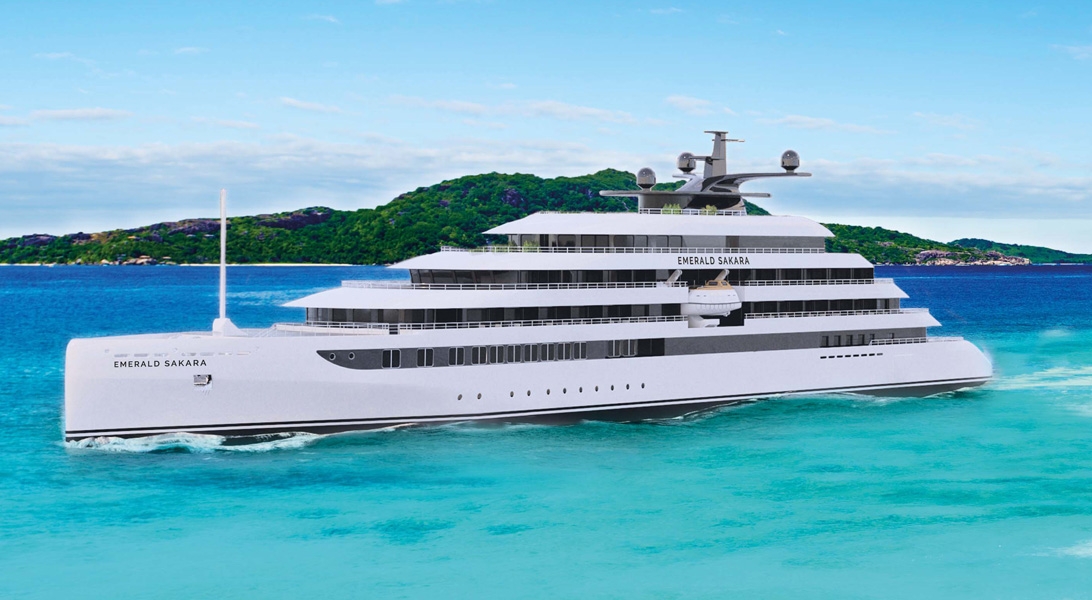
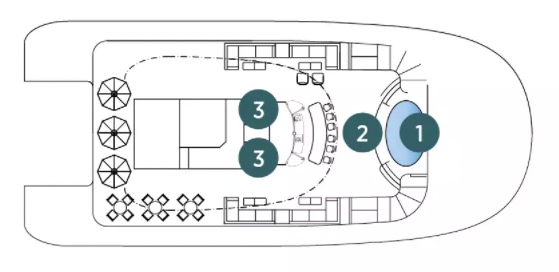





The images shown are for illustration purposes only and may not be an exact representation of what you find on the ship.
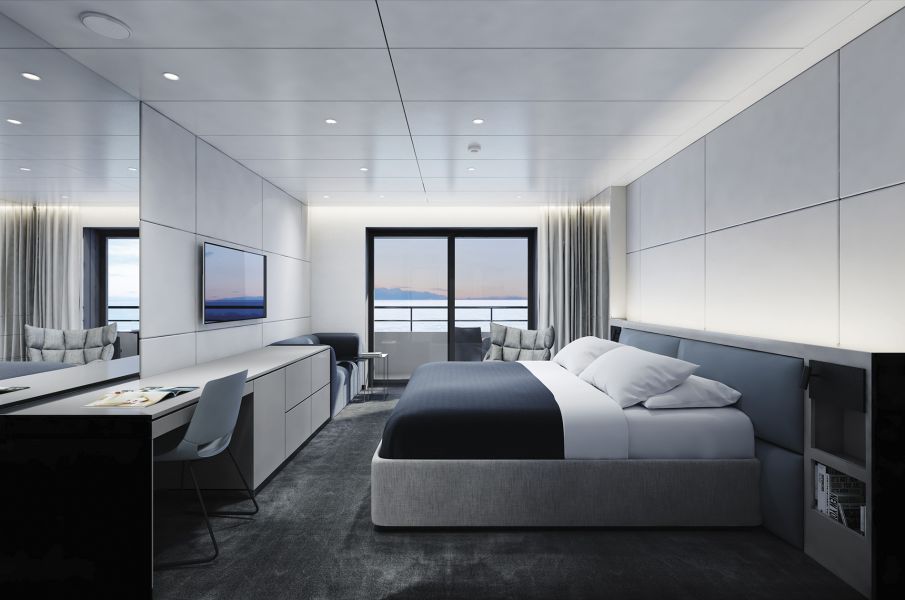
Divided between the Observation and Panorama decks, our Balcony Suites are your stylish home-away-from-home.
Featuring everything you’d expect from a world-class hotel, each one includes your own private balcony, from which to enjoy the stunning panoramas.
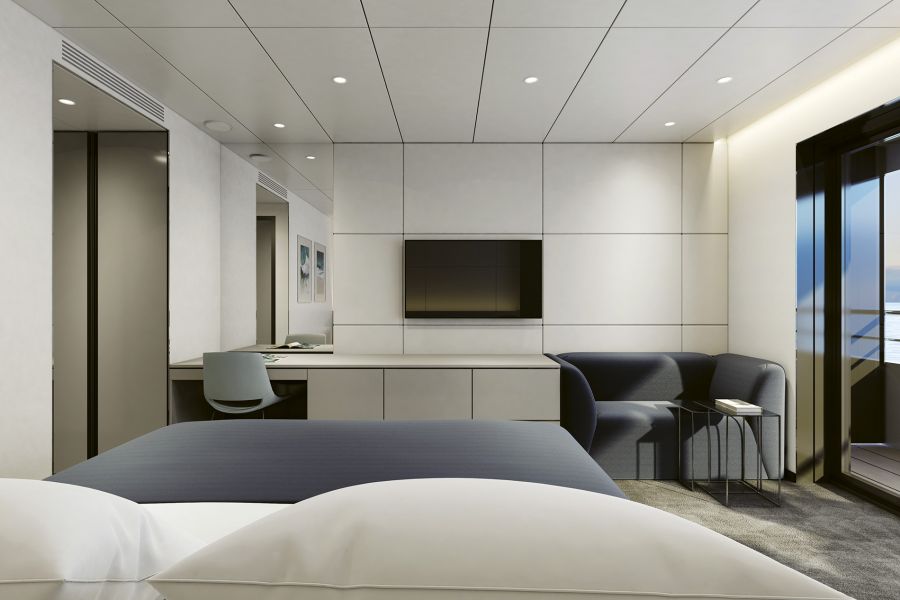
Situated on the Pool Deck, our two Deluxe Balcony Suites boast more space for your comfort.
Along with a private balcony, additional inclusions consist of coffee and tea-making facilities and a pillow menu for the perfect night’s sleep.
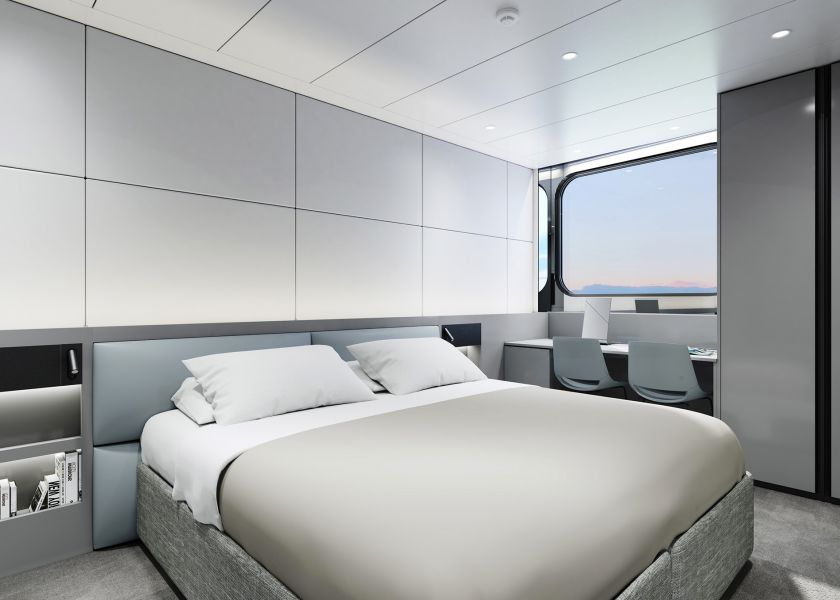
You’ll find six of our superb value Oceanview Staterooms on the Emerald Deck, situated towards the front of the yacht, each with their own ocean-view window.
Instantly settle in with our selection of included modern amenities and make the most of your close proximity to the Horizon Bar & Lounge.
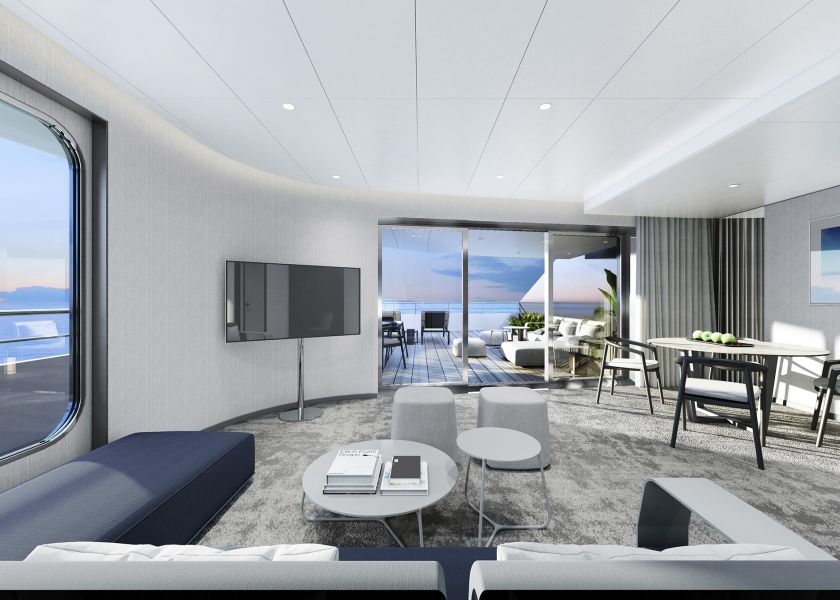
You’ll find our largest and most prestigious suites at the front of the Pool Deck, promising truly exceptional views of the unfolding landscapes.
A separate bedroom and lounge area gives you more room to roam, while a walk-in wardrobe and large private terrace encourage you to really settle into your boutique Owner's Suite.
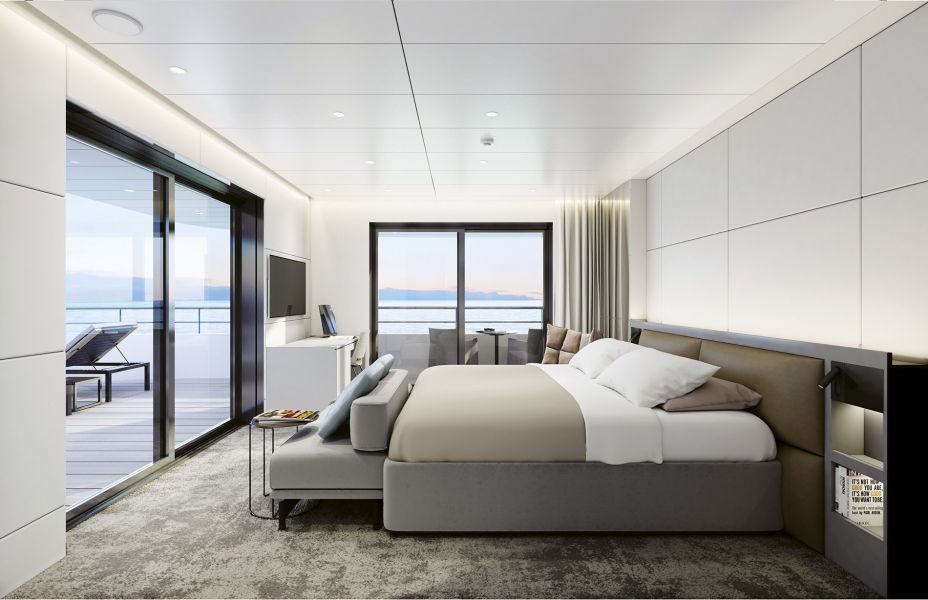
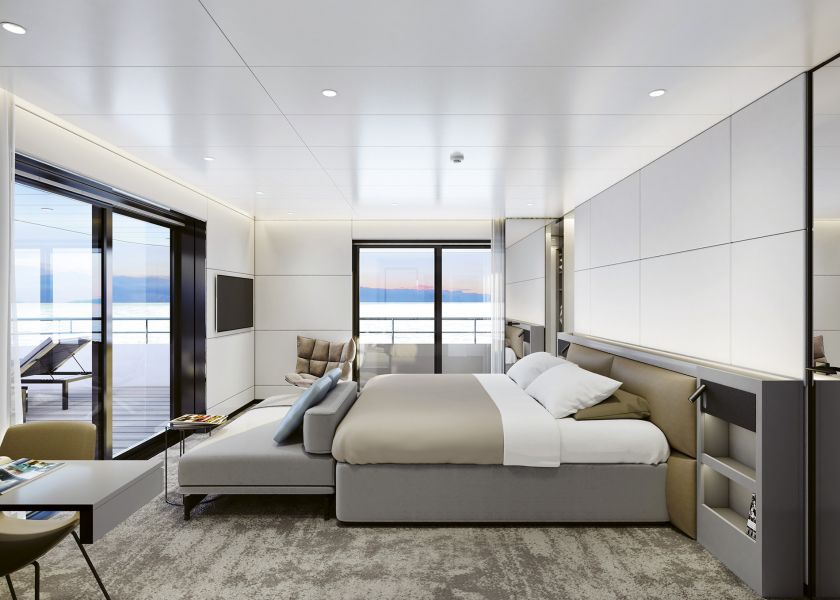
Wonderfully positioned at the back of the Observation Deck, you’ll be treated to sensational ocean and coastal views from your large private terrace.
Toast to your arrival with a complimentary bottle of champagne and a decadent fruit platter which will be waiting for you.
The images shown are for illustration purposes only and may not be an exact representation of what you find on the ship.
The images shown are for illustration purposes only and may not be an exact representation of what you find on the ship.
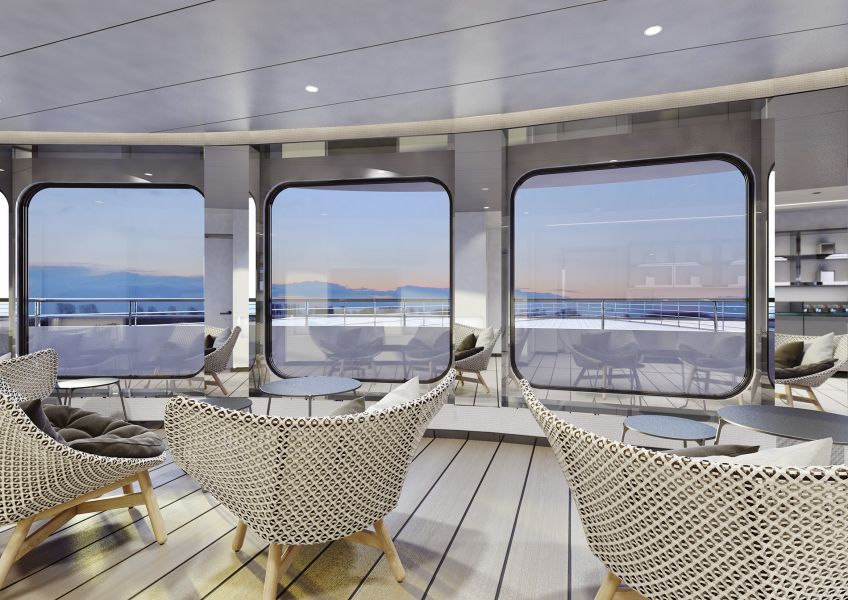
Head to the Observation Deck area for spectacular views or a morning yoga session. In the Observation Lounge, sit back and relax with a good book or play a game of chess.
The images shown are for illustration purposes only and may not be an exact representation of what you find on the ship.
The images shown are for illustration purposes only and may not be an exact representation of what you find on the ship.
| 14 nights aboard the Emerald Sakara | |||
| Return airport transfers | |||
| Wine, beer & soft drinks with lunch & dinner | |||
| Gratuities Included | |||
| One complimentary shore excursion in every port | |||
| Bikes for passenger use | |||
| Free Wi-Fi included | |||
| Port Taxes and Fees | |||
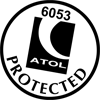 | ABTA and ATOL Protection* | ||
Date 17th Jan 2026 |
Nts 14 |
Please Call for Availability |
Date 17th Jan 2026 |
Nts 14 |
Please Call for Availability |
| Oceanview | Balcony | Suite | |
| (All prices are £GBP per person) | |||
| Sat 20th Dec 202520 Dec 25 |
 |
 |
9,075 |
| Sat 20th Dec 202520 Dec 25 |
 |
 |
18,150 |
| Sat 14th Feb 202614 Feb 26 | Please call for availability | ||
Fusion Cruises when selling travel arrangements is a trading name of The Midcounties Co-operative Ltd. Fusion Cruises is an Accredited Body Member of Midcounties Co-operative Travel Consortium. (ABTA:P6652, ATOL:6053).
Book with Confidence. We are a Member of ABTA which means you have the benefit of ABTA’s assistance and Code of Conduct.
Some of the flights and flight-inclusive holidays on this website are financially protected by the ATOL scheme but ATOL protection does not apply to all holiday and travel services offered on this website. This website will provide you with information on the protection that applies in the case of each holiday and travel service offered before you make your booking. If you do not receive an ATOL Certificate then the booking will not be ATOL protected. If you do receive an ATOL Certificate but all parts of your trip are not listed on it, those parts will not be ATOL protected. Please see our booking conditions for information, or for more information about financial protection and the ATOL Certificate go to: www.caa.co.uk
